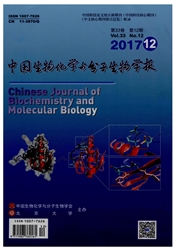

 中文摘要:
中文摘要:
碳存储调控因子A(carbon storage regulator,CsrA)是一种RNA结合蛋白,在细菌的碳代谢、生物被膜形成、运动性、病原菌毒力、群体感应、环二鸟苷酸信号合成、应激感应等多种生理过程中具有重要调节功能,是全局性调控蛋白.它通过与靶标mRNA的特异结合,抑制其翻译或增强其稳定性来调控下游基因的表达,属于转录后调控因子的范畴.CsrA蛋白的表达与活性受碳存储调控(Csr)系统本身多个自主调节回路的精密控制:一些小的非编码RNA(snmRNAs,如CsrB/C)作为拮抗因子与CsrA二聚体结合并抑制其活性;而这些snmRNAs在体内又可在CsrD的辅助下被核糖核酸内切酶E和多核苷酸磷酸化酶降解,释放CsrA的活性.当前,对于Csr系统的调节作用、调控通路与机制的研究是细菌学研究的热点,本文综述了该蛋白及Csr系统的结构、功能和作用机制的最新研究进展.
 英文摘要:
英文摘要:
Carbon storage regulator (CsrA) is a small RNA binding protein to coordinate the expressionof a diverse set of genes in bacteria at the post-transcription level. CsrA dimers can positively or negatively regulate the translation process and/or the stability of target transcripts of the primary and secondary metabolic pathways, biofilm formation, motility, virulence circuitry of pathogens, quorum sensing, cyclic-di-GMP synthesis, and stress response systems. The CsrA expression and activity is governed by an extensive autoregulatory circuitry in Escherichia coli, called the Csr system, in which small non-messenger RNAs( snmRNAs, like CsrB/C) bind and sequester CsrA dimers. The function of CsrB and CsrC snmRNAs in E. coli requires CsrD, a GGDEF-EAL domain superfamily protein, to facilitate nucleases RNase E and PNPase. This review summarizes the latest research regarding the structure and function of the proteins in Csr sustems
 同期刊论文项目
同期刊论文项目
 同项目期刊论文
同项目期刊论文
 Isolation, screening and identification of antagonistic downy mildew endophytic bacteria from cucumb
Isolation, screening and identification of antagonistic downy mildew endophytic bacteria from cucumb 期刊信息
期刊信息
